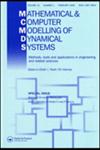Editor’s音符
IF 1.8
4区 数学
Q3 COMPUTER SCIENCE, INTERDISCIPLINARY APPLICATIONS
Mathematical and Computer Modelling of Dynamical Systems
Pub Date : 2020-07-03
DOI:10.1080/13873954.2020.1788808
引用次数: 0
摘要
这是我接任《动力系统数学与计算机建模》(MCMDS)总编辑以来的第一篇社论。首先,我要对我的前任英奇·特罗奇(Inge Troch)为本杂志所做的杰出工作表示深深的感谢。她不仅在过去的25年里担任该杂志的首席编辑,而且在创办一本致力于动力系统数学建模的杂志的想法出现时,她也是关键人物。此外,我非常感谢她在过渡阶段的支持,我希望她作为EiC的宝贵经验也能在未来得到依靠。MCMDS是一个受欢迎的期刊,作者想要发表他们的高质量的科学工作相关的理论概念的推导,模拟,简化,分析,校准,和验证的数学模型的动力系统及其应用于苛刻的现实世界的问题。提交给该杂志的大量论文证明了这一点。我相信,鉴于可用的计算机能力不断增强和新的强大算法的发展,动态系统建模和仿真的相关性将在所有学科中变得更加重要。因此,毫无疑问,该杂志有潜力在未来几年进一步提高其在市场上的地位。在我担任期刊EiC期间,我希望将《MCMDS》办成作者发表高质量数学建模科学成果的首选期刊之一。为了实现这一目标,有几个步骤需要采取:从作者的角度来看,论文的第一次决定时间和最终接受时间是重要的数字。因此,我的目标是使这些时间尽可能短,我的目标是最迟在提交后三个月做出第一个决定。当然,应该理解的是,减少这些时间并不意味着将在彻底的同行评审过程中做出任何妥协。为了拓宽专业领域,我计划扩充编委会。这也将有助于在更多人之间平衡审查过程的工作量。这也应该有助于减少第一次决定论文的时间。因此,第一批措施之一将是组建一个编辑委员会,由经验丰富的研究人员和处于科学生涯早期阶段的研究人员组成。特刊一直是MCMDS的重要组成部分。因此,在与编委会协商后,我们将鼓励研究人员或研究小组组织专门针对动力系统数学建模领域主题的特刊。许多不同的方面决定了期刊的质量和声誉。我很清楚,影响因子是最明显的数字之一。因此,将期刊的影响因子保持在一个合理的高水平是一个目标。然而,我认为最数学和计算机建模的动力系统2020,VOL. 26, NO. 5。4,304 - 305 https://doi.org/10.1080/13873954.2020.1788808本文章由计算机程序翻译,如有差异,请以英文原文为准。
Editor’s note
This is my first editorial since taking over as the editor-in-chief (EiC) of Mathematical and Computer Modelling of Dynamical Systems (MCMDS). First of all, I would like to express my deep appreciation to my predecessor Inge Troch, for her outstanding work for this journal. Not only did she act as the EiC of the journal for the last 25 years, she also was the key persons when the idea of initiating a journal dedicated to the mathematical modelling of dynamical systems came up. Moreover, I am very thankful for her support during the transition phase and I hope that I can count on her invaluable experience as EiC also in the future. MCMDS is a popular journal for authors who want to publish their high-quality scientific work related to theoretical concepts for the derivation, simulation, simplification, analysis, calibration, and validation of mathematical models for dynamical systems and their application to demanding real-world problems. This is evidenced by the large number of papers submitted to the journal. I am convinced that in view of the increasing computer power available and the development of new powerful algorithms the relevance of modelling and simulation of dynamical systems will become even more important in all disciplines. Thus, there is no doubt that the journal has the potential to further improve its position on the market in the next years. During my tenure as EiC of the journal, I want to make MCMDS one of the journals which is among the first choice for authors who want to publish high-quality scientific results on mathematical modelling. In order to achieve this goal, there are a few steps to be taken: The time to first decision and the time to final acceptance of a paper are important numbers from the authors’ point of view. Thus, it is my goal to keep these times as short as possible and I aim at having the first decision three month after submission at latest. Of course, it shall be understood that reducing these times does not mean that any compromises on the thorough peer-review process will be made. To broaden the field of expertise I plan to extend the editorial board. This will also help to balance the work load for the review process among more people. This should also help to decrease the time to first decision of a paper. Therefore, one of the first measures will be to form an editorial board which is constituted of both well-experienced researchers and researchers who are at an earlier stage of their scientific career. Special Issues have always been an important part of MCMDS. Therefore, in consultation with the editorial board we will motivate researchers or research groups to organize special issues dedicated to topical subjects in the field of mathematical modelling of dynamical systems. Many different aspects determine the quality and reputation of a journal. I am well aware that the impact factor is one of the most visible number. Thus, it is a goal to keep the impact factor of the journal at a reasonably high level. However, I think that the most MATHEMATICAL AND COMPUTER MODELLING OF DYNAMICAL SYSTEMS 2020, VOL. 26, NO. 4, 304–305 https://doi.org/10.1080/13873954.2020.1788808
求助全文
通过发布文献求助,成功后即可免费获取论文全文。
去求助
来源期刊
CiteScore
3.80
自引率
5.30%
发文量
7
审稿时长
>12 weeks
期刊介绍:
Mathematical and Computer Modelling of Dynamical Systems (MCMDS) publishes high quality international research that presents new ideas and approaches in the derivation, simplification, and validation of models and sub-models of relevance to complex (real-world) dynamical systems.
The journal brings together engineers and scientists working in different areas of application and/or theory where researchers can learn about recent developments across engineering, environmental systems, and biotechnology amongst other fields. As MCMDS covers a wide range of application areas, papers aim to be accessible to readers who are not necessarily experts in the specific area of application.
MCMDS welcomes original articles on a range of topics including:
-methods of modelling and simulation-
automation of modelling-
qualitative and modular modelling-
data-based and learning-based modelling-
uncertainties and the effects of modelling errors on system performance-
application of modelling to complex real-world systems.

 求助内容:
求助内容: 应助结果提醒方式:
应助结果提醒方式:


